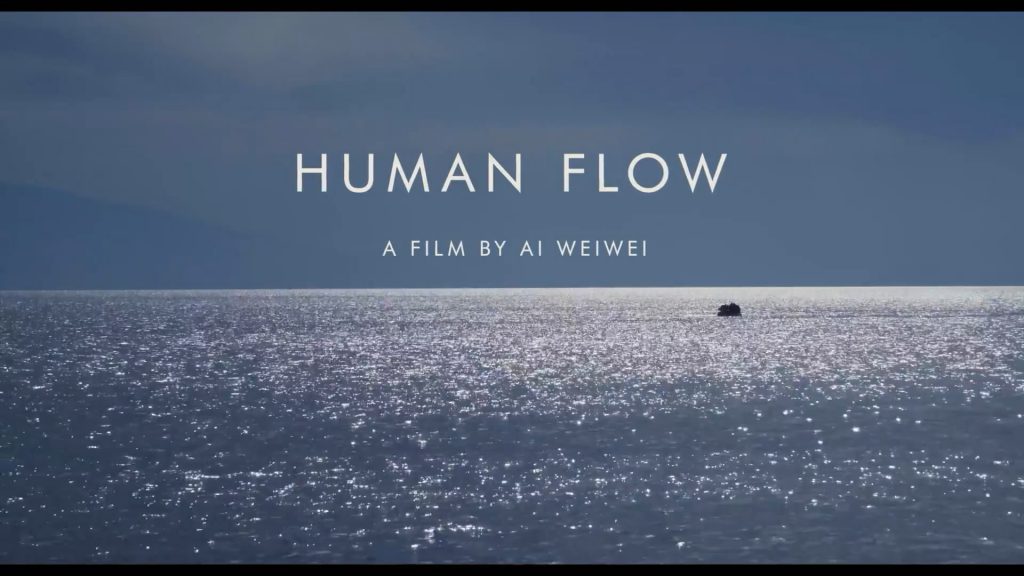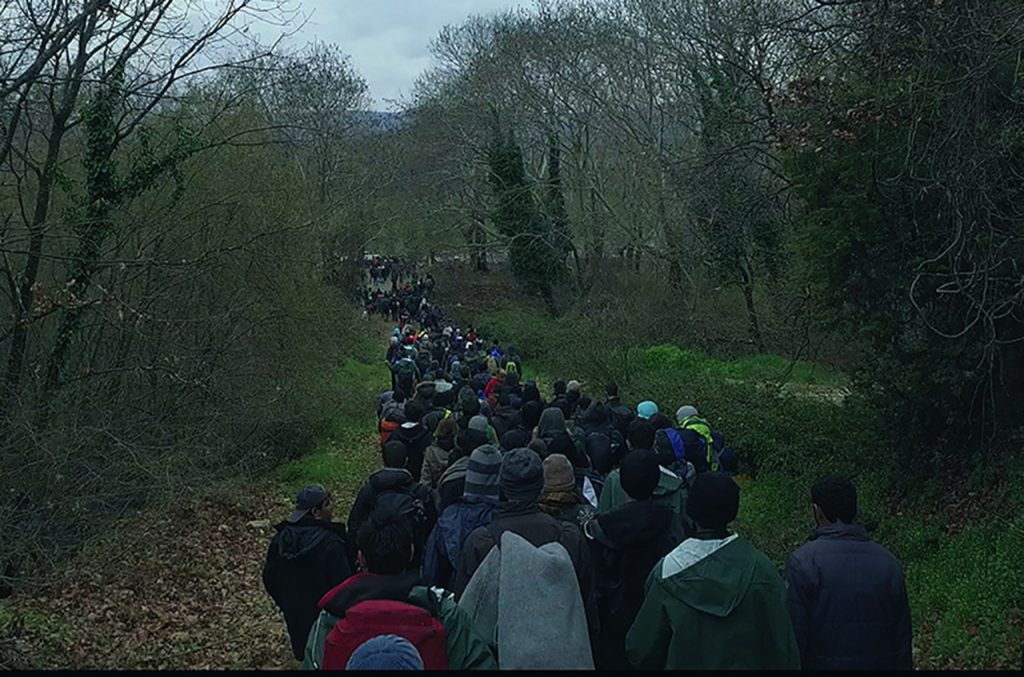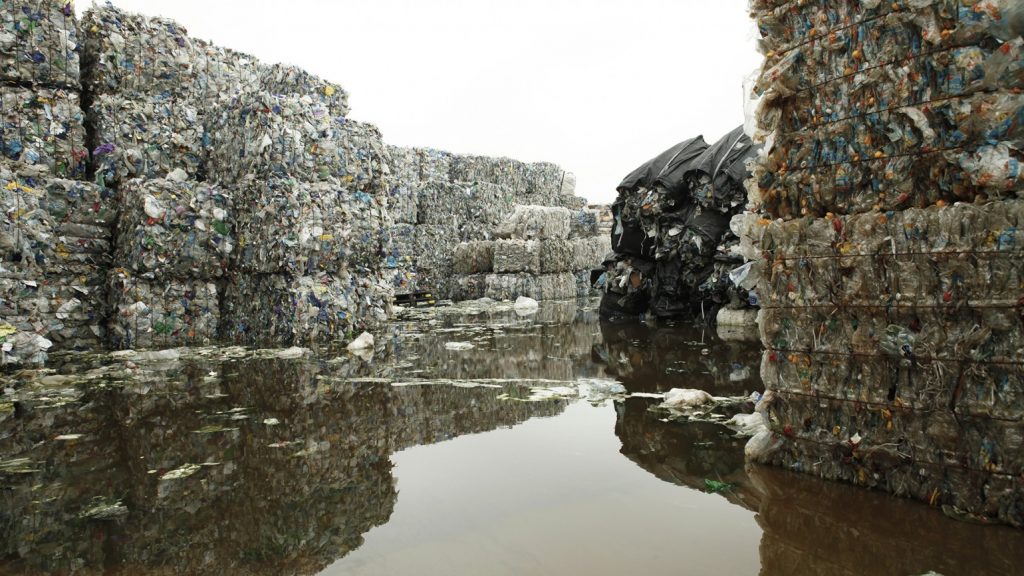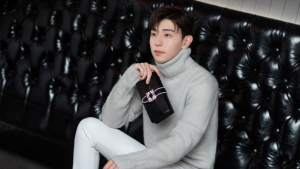This week, in advance of the opening of “Turn it on: China on Film, 2000-2017,” Wang Fen and Ai Weiwei, curators of the documentary series, spoke to CFI on their curatorial process, China, documentary filmmaking, and more.
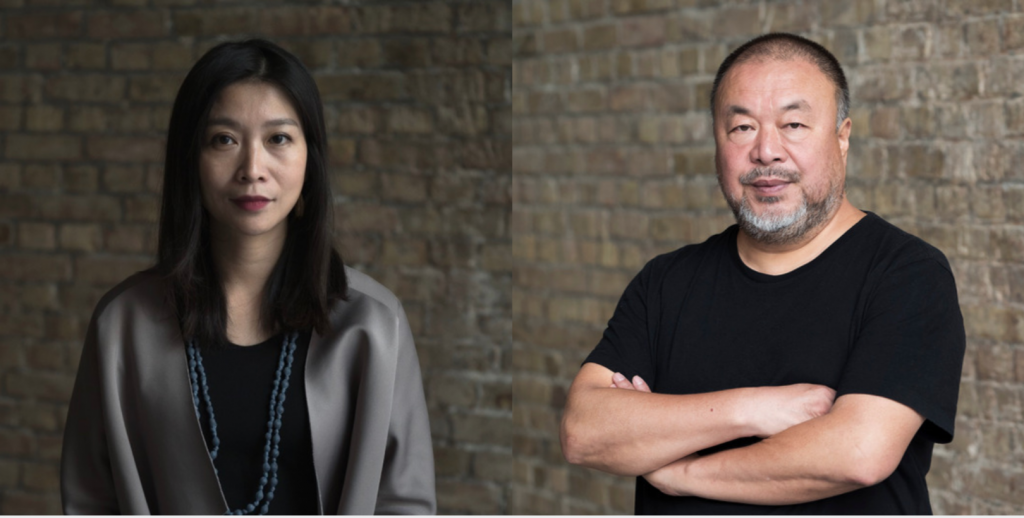
From left to right: Wang Fen, Ai Weiwei.
If China is a mystery to you, if what you learned about this country through newspapers confuses you, how about relearning it through art and cinema?
This fall, the Solomon R. Guggenheim Museum presents documentary series “Turn it on: China on Film, 2000-2017,” along with “Art and China after 1989: Theater of the World,” an exhibition curated by Phil Tinari, Alexandra Munroe, and Hou Hanru, to showcase work by Chinese artists and groups “whose critical provocations aim to forge reality free from ideology, to establish the individual apart from the collective, and to define contemporary Chinese experience in universal terms.”
This week, in advance of the opening of “Turn it on: China on Film, 2000-2017,” Wang Fen and Ai Weiwei, curators of the documentary series, spoke to CFI on their curatorial process, China, documentary filmmaking, and more.
CFI: Can you talk about the curatorial process? Who was the one bringing up the idea of curating a documentary series about China at the Guggenheim?
Wang Fen: The curatorial process was very smooth. The Guggenheim Museum was organizing the art exhibition ‘Art and China after 1989: Theater of the World,’ which Ai Weiwei’s works are a part of. One of the curators of the exhibition, Alexandra Munroe, had a meeting with Weiwei to discuss how they could make the art exhibition a more comprehensive study about China. Weiwei told Ms. Munroe that if they wanted to help people further understand China and the history and current state of Chinese contemporary art, showing documentaries about these themes could be a great way. Ms. Munroe loved this idea. So they decided to curate a documentary series to be presented concurrently with the art exhibition.
As to how I joined the project, I am a documentary filmmaker and have made documentaries back in China. After moving to Germany, I still pay close attention to the development of Chinese cinema and the conditions of Chinese filmmakers. Weiwei invited me to co-curate the documentary series for the Guggenheim’s art exhibition, and I accepted his invitation. But even before he invited me to join this project, I already had the idea of organizing a film series in Germany to systematically introduce Chinese documentaries to Western audiences. I remember I once mentioned this idea to Huang Wenhai, a fellow documentary filmmaker. China and the West have lots of economic interactions, but most people in the West don’t really have a clear understanding about China. Many ideas they have about China are still stereotypical, which is how I feel about the situation after living in Germany for a few years. I think it would be very meaningful if I can help people better understand China through documentaries.
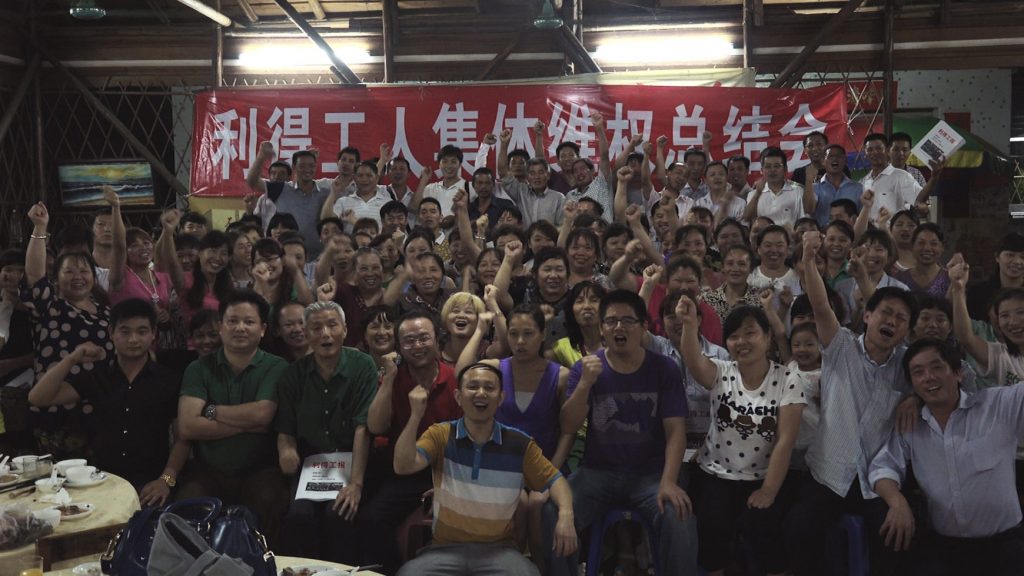
Still from ‘We the Workers’
CFI: This doc series is presented concurrently with the exhibition ‘Art and China after 1989,’ but the documentaries are made between 2000-2017. Why didn’t you choose any docs made between 1989-2000? Was it because there were not many docs made during this time period?
Wang Fen: There were not many documentaries made during this period. In addition, Chinese media regulators recently tightened control over Chinese filmmakers showing their films overseas, so some filmmakers were discouraged and decided not to participate. As a result, we didn’t get to include any films made between 1989-2000. Although the films in this series are made between 2000-2017, what these films documented was pretty much Chinese society between 1989-2017, which is parallel to the time period studied in the art exhibition. The development of documentary filmmaking in China was still very limited in the 1990s, as very few people had access to equipment back then. The rare few who had access were people who worked for state-owned film & TV studios. These people had very little interest in making the type of documentaries that couldn’t be distributed and wouldn’t be backed by their studios. Around 2000, home video cameras suddenly became available and affordable, which led many young filmmakers to start making films on the subjects they care about.
CFI: Why did you decide to organize a separate documentary series rather than integrate some clips from the docs into the art show? Many of the docs you selected are longer than 3 hours. The longest one runs for almost 7 hours. Why did you decide to show the full versions of the films? Are you concerned that some audiences would be deterred by the running time of the films?
Wang Fen: We present the documentaries as a series for the audience to gain a more comprehensive understanding of China. The documentary is an independent art form and it comes from reality. When a documentary is made, its length reflects the filmmaker’s understanding of the subject and how he/she wants to present the story. We didn’t want to just add some clips into the art exhibition, as it’s not how the filmmakers intended their works to be presented when they made them.
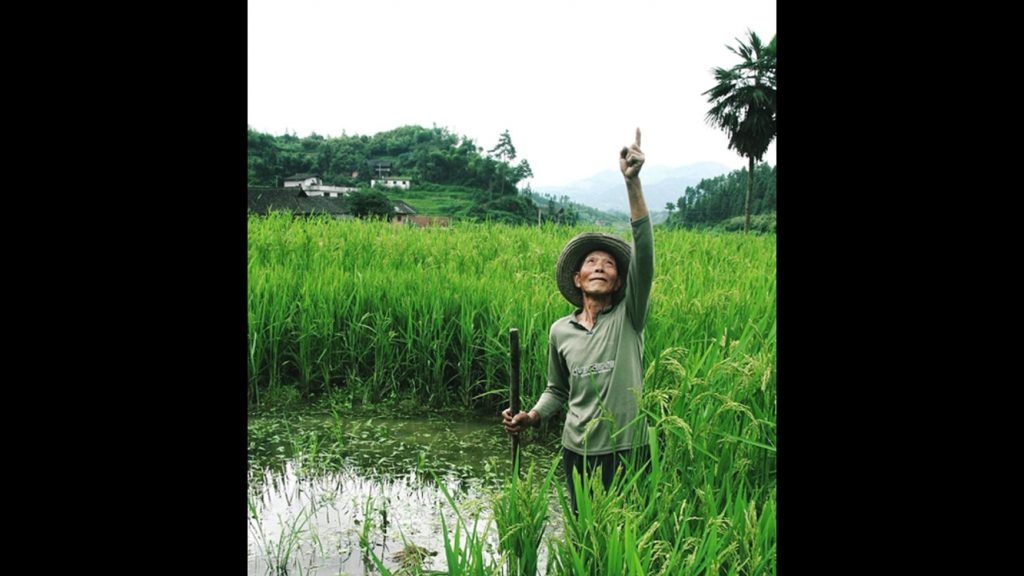
Still from ‘Falling from the Sky’
Admittedly, some of the films we are showing this time are really long, much longer than the films we usually see in movie theaters. Luckily, we are showing these films at the Guggenheim, a modern and contemporary art museum. I believe audiences who come to the Guggenheim are more open to see different types of works. Some people stand in front of an artwork for hours while some can finish seeing a museum within a few minutes. It really depends on if and how much an audience is interested in art and the theme of a specific exhibition. This documentary series is about China. I believe people who come see these films are already interested in the subject and will come with interest and curiosity.
CFI: If we ask you to recommend one must-see film from this series, which one would you recommend and why?
Ai Weiwei: I would suggest our audience to always go see another film, because I am very sure it will be a totally different experience. Film is about perception. The thing about perception is: it’s different every time. Each viewing experience is different. One can’t replace another.
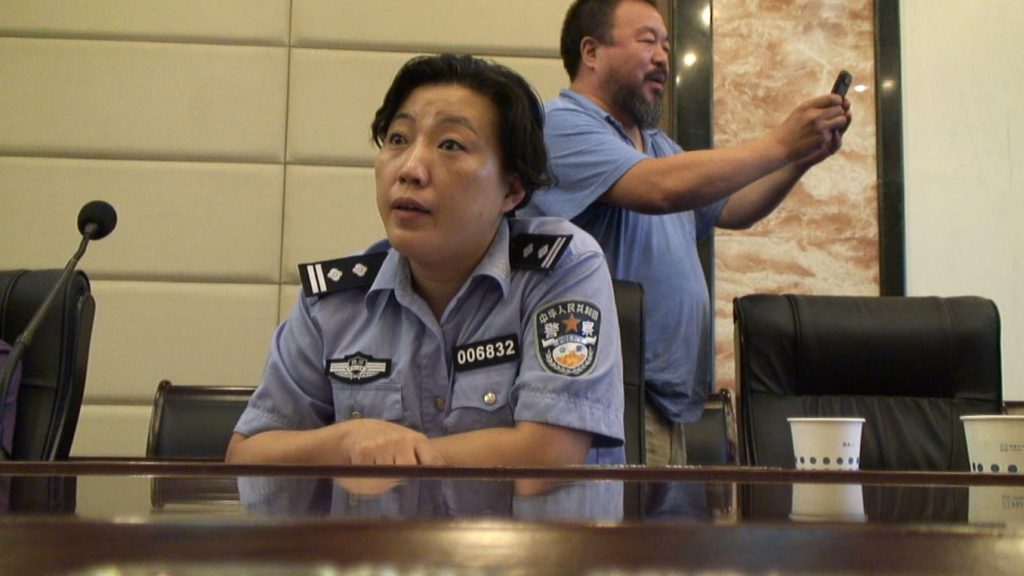
Still from ‘Disturbing the Peace’
CFI: Some of the selected films center around Chinese contemporary artists and their living condition. What role are Chinese contemporary artists playing in today’s China? How is their condition compared to that of their fellow artists in the West? Or is it pointless to compare them this way?
Ai Weiwei: An artist’s living condition can hardly transcend the reality (social, cultural and political environment) in which he/she lives in. To quote Mao Zedong, “in a class society, everyone comes from a certain social class, and one’s perspectives always somewhat reflect his/her class.” I think Mao has a point. China is still developing. The country has been changing rapidly in many aspects, but it hasn’t changed much politically. This makes the country look like a giant monster. China and the West have no relevance whatsoever with each other in many aspects. Culturally, the way Western culture develops has its own limits. Prejudice is a common phenomenon.
CFI: Have these selected films been distributed in China?
Wang Fen: Most of the documentaries in this series haven’t been distributed in China. As these films didn’t get distributed, their influence is very small. This area is pretty much ignored in China. As an increasing number of Chinese films participate in film festivals overseas and gain exposure internationally, new policies have been made recently by China’s media regulators to prohibit filmmakers from participating in film festivals overseas without permission. Some domestic documentary film festivals have also been suspended over the past a few years. All these bring pressure to filmmakers. In China, documentaries by individual filmmakers haven’t been systematically studied or presented. Their current state is similar to the state of Chinese contemporary art at its early stage.
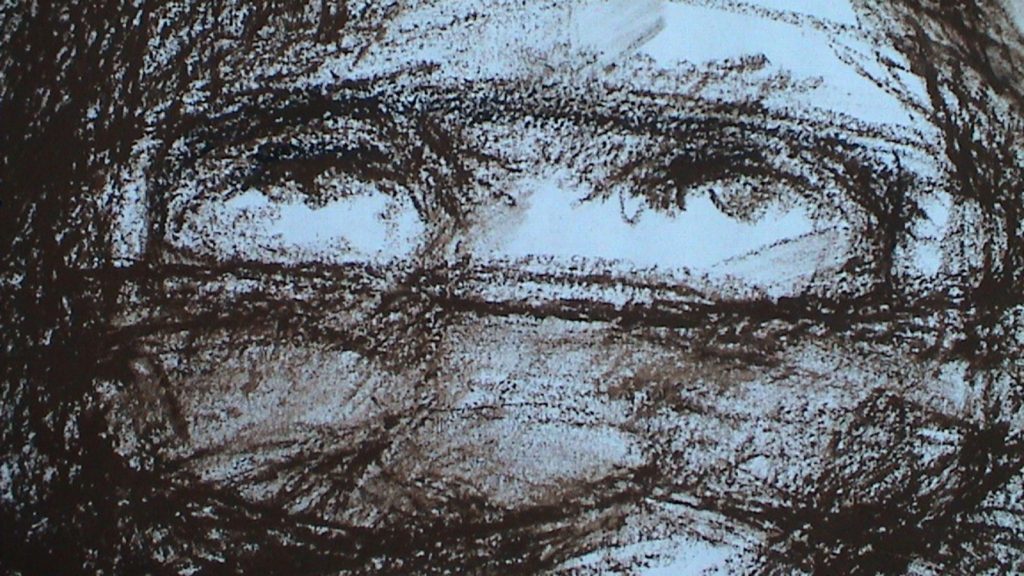
Still from ‘In Search of Lin Zhao’s Soul’
CFI: How did you two collaborate with each other on this project? Did you disagree with each other while selecting films? How did you reach a decision?
Wang Fen: It’s quite easy and pleasant to work with Weiwei. He is very capable and experienced. We watched and discussed the films we received from various sources together. Mr. Huang Wenhai also helped coordinate the curatorial process and get screeners for us. Both of us are documentary filmmakers ourselves, and we naturally have different preferences. This allows us to diversify the lineup. Ultimately, we want this documentary series to be richly structured. It can be raw and fragmented, but it should have its own character and is closely related to our time. This is the consensus we had as curators. My only pity about this series is that it doesn’t include many films about urban China. Today, urban life is a big component of this country. Not many documentaries cover this aspect yet.
CFI: To what degree do these documentaries reflect the true reality and the most important issues of contemporary China?
Ai Weiwei: I can say this documentary series along with the art exhibition is by far the most comprehensive presentation ever organized to reflect the reality and social issues of contemporary China, as well as individual art practice in China.
CFI: We know that you are also a documentary filmmaker. Can you please tell us about the documentaries you made before?
Wang Fen: With a desire to express myself, I made my first documentary in 2000. I wanted to understand my roots through this documentary, and the easiest way I thought was to interview my parents. Therefore, I went back to my hometown in Jiangxi Province and made a documentary called ‘More Than One is Unhappy’ (不快乐的不只你一个). I was in my 20s back then, and was doing post-production work for TV shows to make money. I was able to borrow equipment from the studio where I worked to make my first film. Before I made this film, I had experience working on set and in post-production, but had never touched a camera. My true state and feelings at that time were vividly reflected through the shaking camera and the raw emotions expressed by my parents in the film. After this film was made, it was screened in Beijing to small groups of people, and caused some discussion. In my opinion, people were interested in this film because it was different than most of the films they could see. People were used to watching mainstream and so-called normal content back then. My film was very raw, personal, and didn’t follow the rules, which people considered an expression of freedom. I remember an article about my film appeared in a newspaper in the “society” section with the title: “A Girl Made a Video to Record Her Parents’ Fights.” Later, this documentary was selected to screen at the Yamagata International Documentary Film Festival in Japan and received the New Asian Currents Award for new, up-and-coming Asian filmmakers. Not many people in China have seen this film. I put it on my bookshelf like a journal and don’t want to touch it anymore. To me, it is very personal.
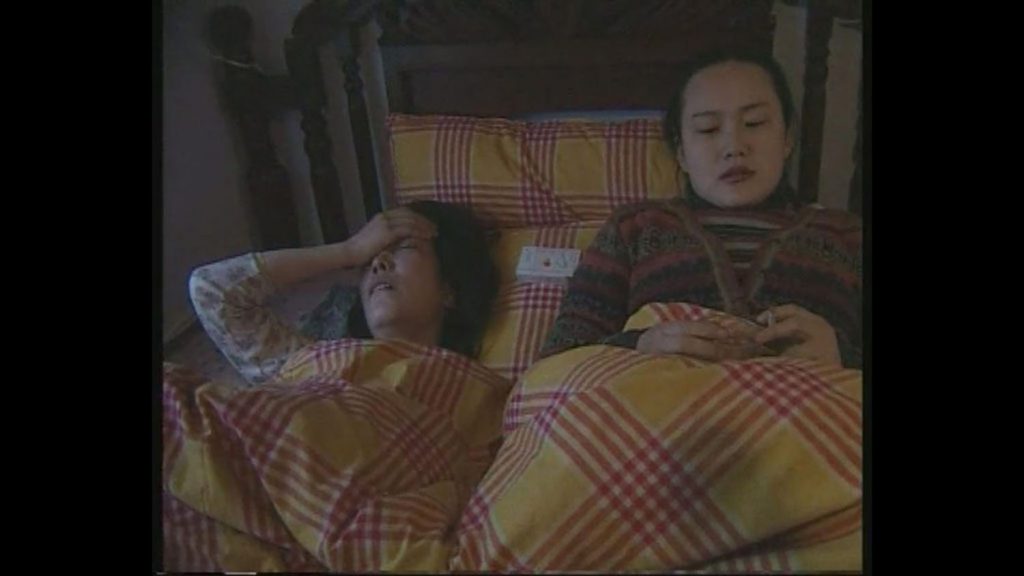
Still from ‘Nightingale, Not the Only Voice’
In 2006, I made another film called ‘Xiang Zi’ (箱子 or ‘The Case’), a narrative feature exploring romantic relationships. Right after digital cameras became more available, many documentaries focusing on personal experiences were made. ‘Nightingale, Not the Only Voice’ (夜莺不是唯一的歌喉), a doc in this Guggenheim series, is also a very personal documentary. Before making this film, director Tang Danhong mainly created works as a writer and poet. This film is like a visual novel or visual poetry following her thoughts and journey. It’s a touching and compelling work.
CFI: Which is more challenging: making a documentary or curating a documentary series? Which one do you enjoy better?
Wang Fen: I’ve made both documentary and narrative films before, but directing films is not my occupation. I like to call myself filmmaker, as this identity provides me perspective. Just like some people identifying themselves as artists, it’s a perspective they choose. The amount of work I’ve done in film is not a lot. However, film gives me a perspective, which, to some degree, protects me. I can get something more in film besides the harshness of life. Currently, I am writing a script and also do post-production for documentaries. I participate in some film-related projects, but I don’t plan to become a professional filmmaker. Because of the retail nature of the film industry, the practical and commercial aspects of producing and distributing a film have nothing to do with feelings, but they can decide how a film ends up. As a result, these aspects influence how a filmmaker thinks. Especially, with the development of the Internet, I feel more and more pessimistic about the future of moviegoing. Documentaries usually don’t involve big investments or high financial return, which actually gives documentary filmmakers more freedom (to make what they really want to make rather than making films for commercial purposes). People often say that documentary is the oldest son of cinema and the poor relative of narrative film. Right now, I feel more optimistic about the future of the documentary. Although documentary films are usually less entertaining or expressive, its recording function still exists and can’t be changed.
I feel very happy that I got to curate this documentary series at the Guggenheim. It’s a great experiment. I love film. Even if I don’t make films, I still feel very happy when I can do something for my fellow filmmakers.
CFI: Any plans to make more documentaries or curate more documentary series in the future? If so, can you share some details?
Ai Weiwei: We currently live in a state where we don’t make plans or set goals, so, I don’t have any details to share.
For tickets and more information of ‘Turn it on: China on Film, 2000-2017,’ visit the site here.


